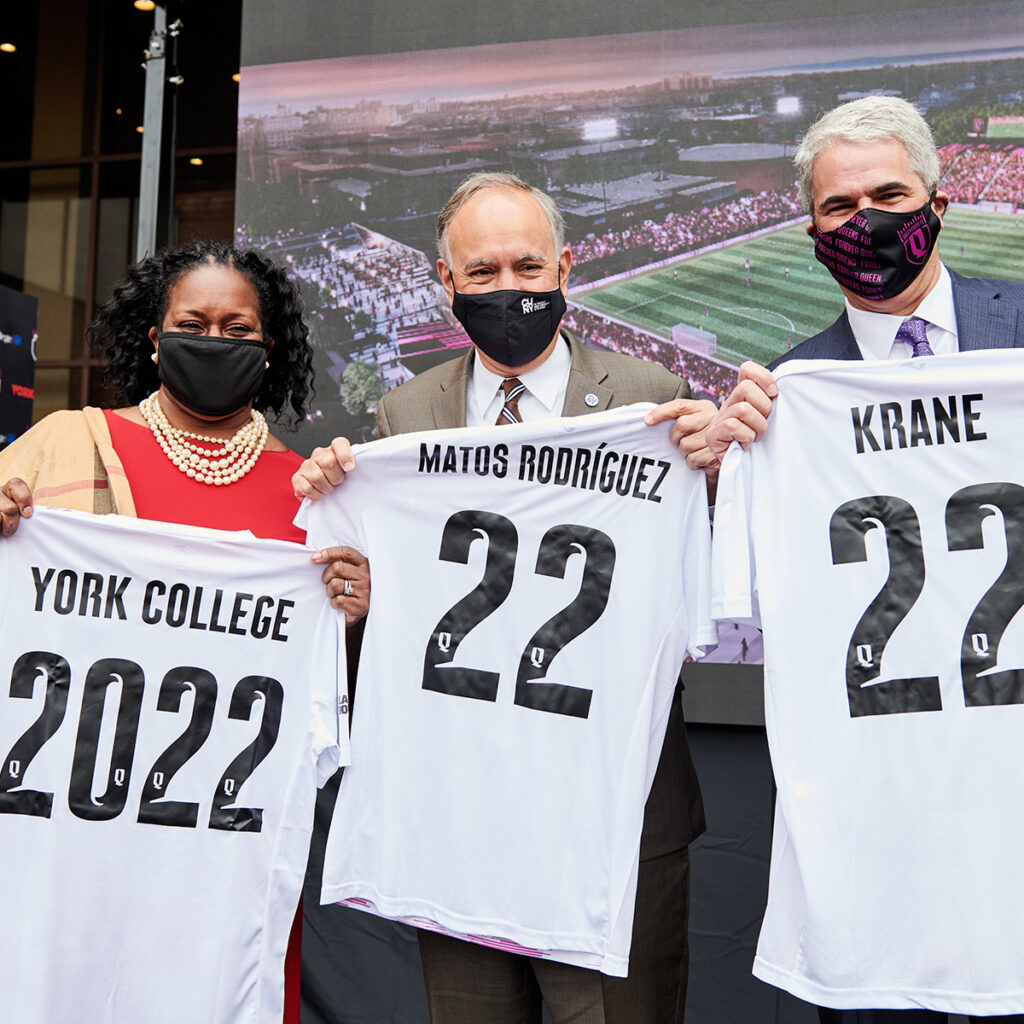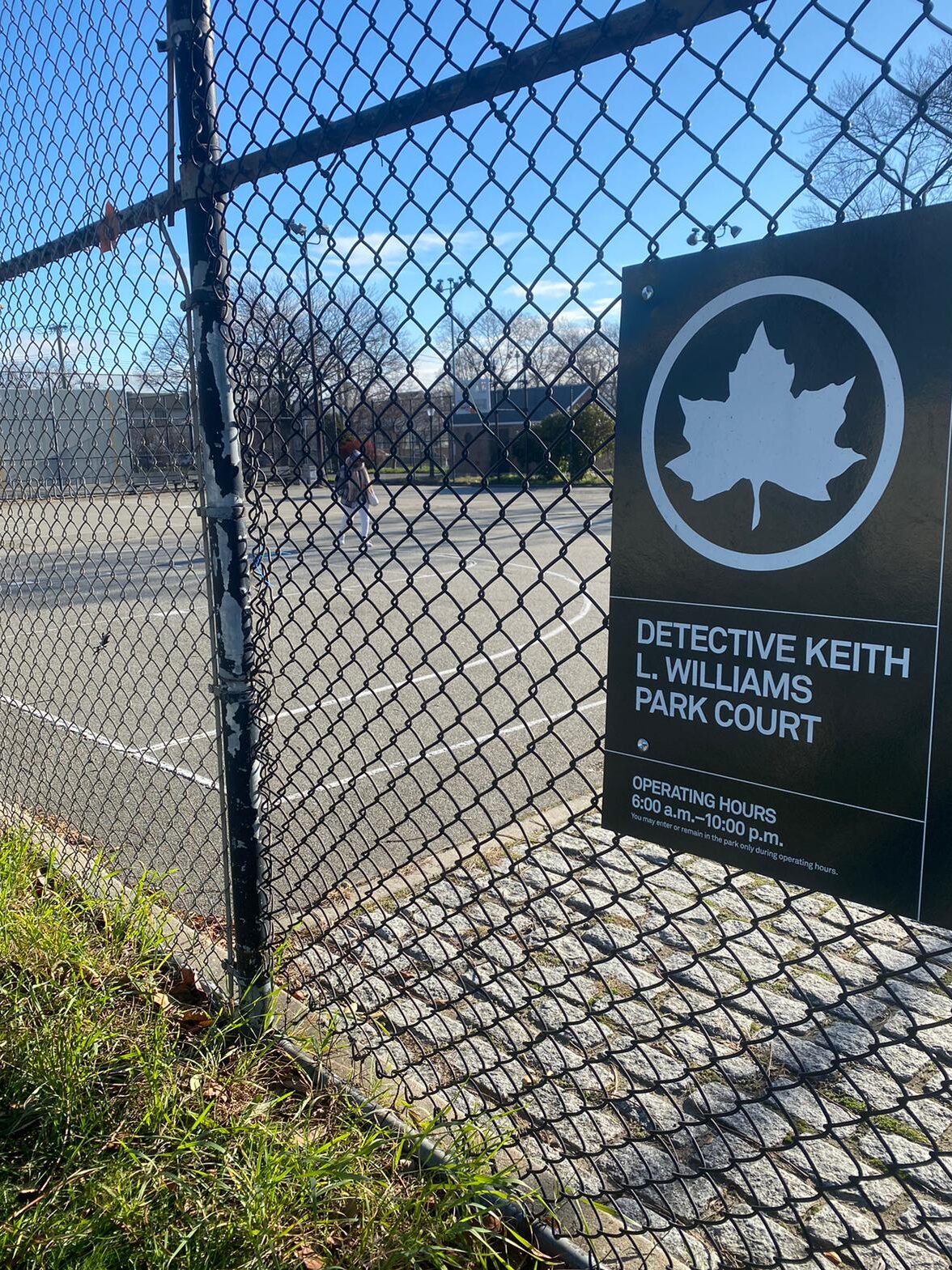Club With Contract “Reviewing its Plans”

By Ilvea Lezama and Sara Martinez
After weeks of refusing to comment or grant repeated requests for interviews about the fate of the proposed soccer stadium on York’s campus, Pandora’s Box received a terse email saying only that the agreement to build the stadium, “remains in effect.”
Despite public assertions about transparency by their administrations, CUNY and York officials are keeping the campus community in the dark about the machinations behind the unusual deal with the Queensborough Football Club (QBFC).
The 7,500 seat stadium, announced with fanfare in April 2021, originally resulted from CUNY officials awarding a contract to build a temporary athletic facility in the lumpy, unusable field behind the Health and Physical Education (HPE) building.
The 280-page agreement stipulated that the stadium would be shared by the QBFC teams and York’s student athletes. At that time CUNY and York officials declared the stadium would be ready for use by York athletes by Spring 2022.
After preliminary work ground to a halt, York’s Interim Vice President for Finance and Administration Charles Bozian announced that the project was delayed but moving forward.
“QBFC has been acquired by the New York City Football Club, a larger major league soccer team in Queens,” Bozian said during the September 2022 meeting of the college senate. Bozian assured student and faculty senators that the administration was holding weekly meetings, on the weekends, to move the project forward.
“They (NYCFC on behalf of QBFC) will facilitate the final funding and actual building of the facility,” said Bozian at the same senate meeting. Bozian went on to say that York officials expected to receive $1.8 million dollars from the deal over the next year.
Then, on Nov. 16, NYCFC announced they had struck a deal with New York City officials and Mayor Eric Adams to build “the city’s first professional stadium” in Willets Point, also located in Queens. The NYCFC promised to pay for the construction of a 25,000-seat stadium, which is estimated at $780 million, according to The New York Times.
On the same day of that announcement, York President Berenecea Eanes sent out a college-wide email and web-posting announcing that York had received a, “$7.5 million transformational gift from the New York City Football Club for the benefit of York College as it carries out its vital mission of accessible, high-quality education for the citizens of Southeast Queens, New York City, and beyond.”
There was, however, no mention of the proposed stadium. In the email and web posting, Eanes wrote, “The $7.5 million unrestricted gift will give the Foundation and York College the discretion to use the funds where the needs of the College are greatest…”
There was no differentiation between the Foundation, which is a separate non-profit entity, and the college itself.
Student-athletes, especially the soccer teams, have been wondering since before the announcement last year when construction would start on the soccer stadium. The 2022 soccer season ran from September to November.
Without a field to practice or play home games on, the men’s and women’s soccer teams have had to practice for their games at Detective Keith L. Williams Park on the corner of Liberty Avenue and 172 Street, approximately 20 minutes from campus.
“It takes us thirty minutes to get there,” said Ahmed Elwadany, a midfielder for the men’s soccer team and Aviation Management major. “If you do your best and run, then about fifteen minutes. Sometimes we have to cut it short to make it back on time for the two o’clock class.”

The mens and womens teams have been without a field in Queens for their home games for years. Instead, the teams make the approximately 30-minute drive to Floyd Bennett Field in Brooklyn.
Elwadany said that he thinks the lack of a home field to play on has disengaged and discouraged the student population to show up and support their home games during the season.
But Courtney Boothe, the head coach for the men’s soccer team at York, remains optimistic.
“I believe that if we build a good facility and develop the infrastructure, it will improve recruiting,” said Boothe. “There needs to be more investment on that side of campus.”
Boothe has been the head coach since 2021 and has 20 years of experience coaching soccer. “The optics were good,” Boothe said of his initial thoughts of the stadium. He thought it was favorable because of the impact it would have on his team and the Athletics Department. “The campus has the real estate for these projects, but the space has not been properly maintained,” he said. “Because of this, the team is obligated to practice at public grounds that don’t have the appropriate spacing.”
Meanwhile, state officials are moving ahead with plans to rehabilitate York’s existing and defunct track and field site which has been left unused for decades on Liberty Avenue just a block west of the proposed stadium site.
Last month the state agency that oversees CUNY construction projects accepted bids to repair and reconstruct the track and field, which developed sinkholes because the original contractors failed to properly excavate and fill the site. They also left contaminated oil tanks and soil which now have to be removed and remediated.
The estimated cost of the cleanup and reconstruction was posted at between $5.1 and $5.7 million. Five bids came in ranging from $5.8 million at the low end to $ 10.9 million at the high end. The state’s website has yet to post whether the contract has been awarded.

As for the stadium behind the Health and Physical Education building, many remain skeptical that it will ever be built.
“The site is so freaking small, the first question is, can it even fit?” said Neil deMause, an expert in the construction of stadiums all over the United States. “It is really, really small for any type of soccer stadium. It seems more like a place where you can pretend to put a stadium on than to actually build something.”
DeMause, who co-authored the book Field of Schemes, is an expert who has testified before Congress on the politics and financing of sports stadiums. He has followed the story of the QBFC deal on his website fieldofschemes.com, where he posted an article linking to the 280-page contract between CUNY and QBFC after waiting nearly four-months for CUNY to produce it under the Freedom of Information Law.
DeMause highlighted several questionable aspects to the deal whereby a private football club with non-transparent financial backing managed to get a public university to ram through a deal with no environmental impact studies among other deficiencies in oversight.
Officials from NYFC and QBFC did not respond to requests for interviews. CUNY officials deferred all requests for information to York officials.
Reporters from Pandora’s Box made multiple requests to both York officials for clarification about the issue. An initial interview meeting in November was canceled, a subsequent request was deferred for ten days, which came and went with no response.
Rather than granting an interview, on Dec. 8 York’s Vice President for Institutional Advancement and Communications Kathryn Cousins, who’s hiring was approved by the Board of Trustees in October at a salary of $213,000 per year, replied to the official college newspaper with the following email:
“As you know, CUNY on behalf of York College entered into an agreement with QBFC for the construction of a temporary modular stadium at York College. At this time, that agreement is in effect. We are aware of the changing environment in New York City for its professional soccer teams, as well as QBFC’s recent statement that it is reviewing its plans following the announcement by NYCFC that it will be building a soccer stadium at Willets Point. We remain in regular communication with QBFC and should there be a change in its plans moving forward, we will keep our community informed as we ourselves receive this information.”
The “recent statement” by QBFC is nowhere to be found on the club’s website, nor is there any mention of their acquisition by NYFC or the recent developments related to York College.
Similarly, there is no mention on the NYCFC website about their acquisition of QBFC or their $7.5 million donation to York College.

